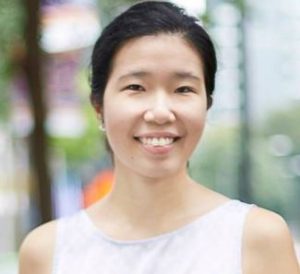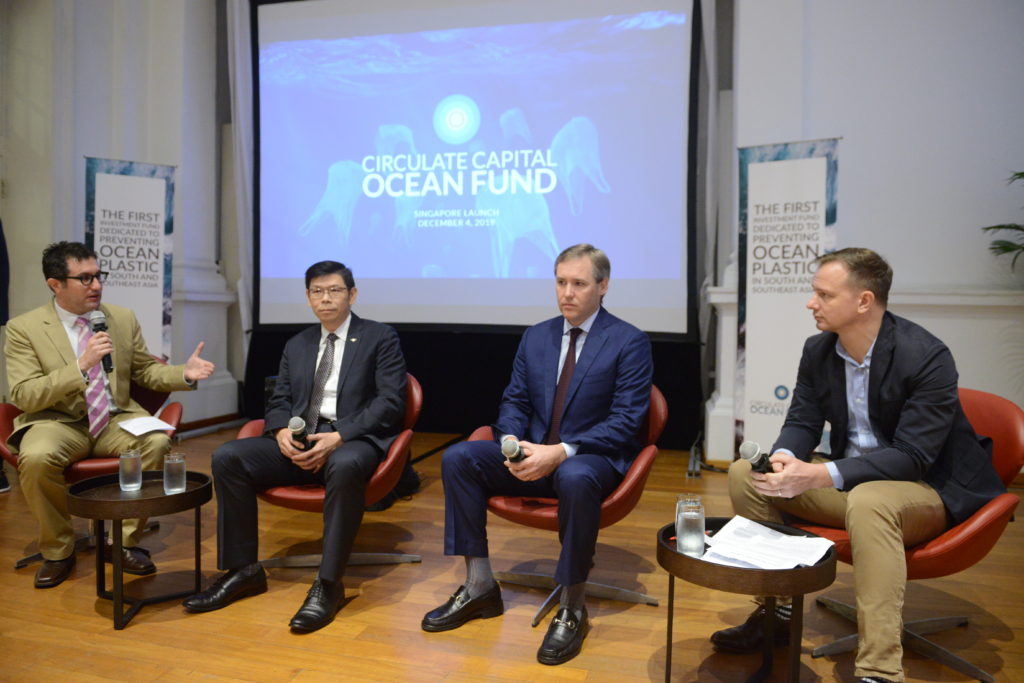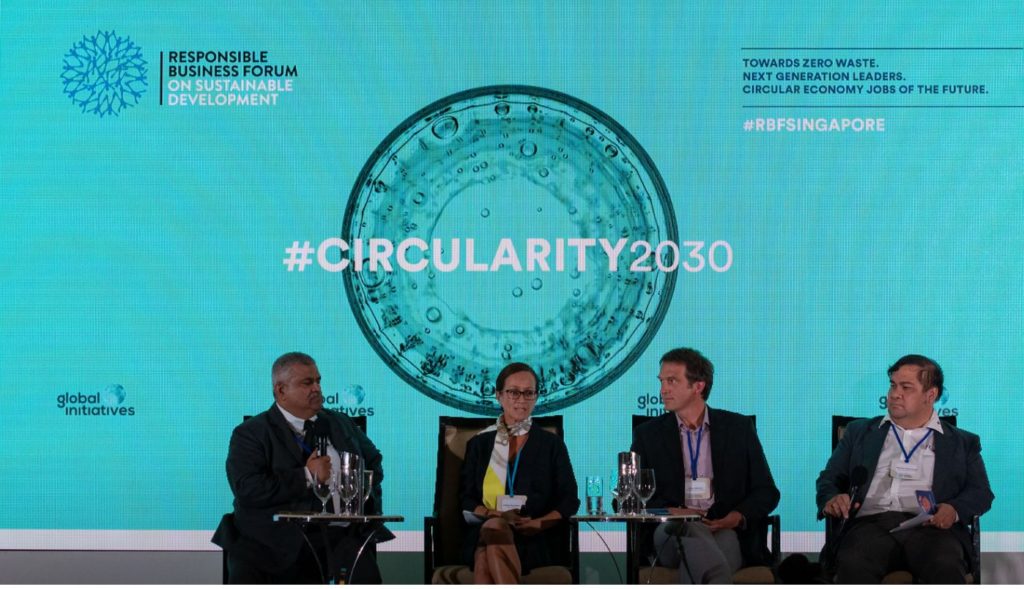In many instances, sustainability has become a way of living, a commitment, and a journey to improve lives and save our gaia for the future generation. We have witnessed businesses and individuals taking various steps in supporting the sustainable way of living from limiting the use of plastic straws, to bringing lunch boxes and water bottles for takeaways – small steps with big impacts.
Green In Future had the opportunity to conduct exclusive Q&A with heroines that champion various efforts to advocate sustainability during the North West Youth Forum – Sustainability this year. Ms Nichol Ng, Co-Founder and Chief Food Officer of The Food Bank Singapore shared about the importance of responsible consumption. Dr Angela Lee Hui Mien, Vice-President, Sustainable Development, Mandai Park Development spoke on the role of businesses in promoting sustainable efforts. And we also discussed with Ms Pek Hai Lin, Manager, Zero Waste Singapore on challenges to achieve zero waste in Singapore.

Ms. Nichol Ng
Co-Founder and Chief Food Officer of The Food Bank Singapore
1.What are your takes on the consumption habits of people in Singapore in comparison to other countries in Southeast Asia?
I do not have sufficient data to back this statistically but I do know that our food waste is very much in line with other developed nations in the world. In terms of habits, I would say that the “cheaper” cost of food may sometimes lead to higher Waste because the cost to import food is low without any tariffs etc so to import in bulk etc..is easy. This may at times constitute to larger stockpiles.
2.What progress can we see in terms of food consumption since the inception of The Food Bank Singapore in 2012?
One of the major trends that I see is sustainable or responsible consumption. Be it questioning the source of food or simply thinking twice about wasting too much. This is in part due to social media and simply increase consumer awareness of this global issue.
And what do you hope to achieve in the next 5 years? Our mission is to eradicate Food Insecurity in Singapore in all Forms by 2025 and this mission can be supported by the excess foods that lingers in the Ecosystem, all the better. So we also get to play a role in feeding those in need and yet be an environmental champion.
3.If you had all the resources, what would you have done to curb food wastage?
I would replace our regular RUBBISH bin with a self sorting bin targeted at Food. Still good to eat food can go into 1 channel and another channel can target organic food waste for composting etc…this is more targeted at Homes.
One easy ways to reduce food waste is also to bring donations to TOP OF MIND now instead of dumping which is still the most common method of discard even for still good to consume food. Donate before Dumping.
 Dr. Angela Lee Hui Mien
Dr. Angela Lee Hui Mien
Vice-President, Sustainable Development, Mandai Park Development
1.What does the term sustainability mean to you?
Sustainability is about bringing social progress to mankind – a better life to people in general, with the least environmental impact and at a feasible cost. It is about achieving a balance between improving lives and resource efficiency, and being able to do more with less as we develop.
2.How do you ensure sustainability efforts is being uplifted across parks and other entities under Wildlife Reserves Singapore?
Everyone who is co-opted into this project, from our in-house team to our external partners, must embrace the principles of sustainability – from concept to construction phase, through to the maintenance and management stage. In the parks, sustainability is embedded into the everyday business as well.
Sustainability metrics do not just apply to the Sustainable Solutions department, and we encourage and support other teams across the organisation to incorporate sustainability into their daily work as well. For example, when the marketing department is running a campaign, they should think about how it can be done with less resources and to incorporate a sustainability element.
Internal stakeholder engagement is critical in the process, to get different departments to understand the importance of making sustainability a part of their daily work. Hence if my job is done well, I should be made redundant!
3.In your opinion, what more can Singaporeans and residents in Singapore do to promote sustainable living?
Sometimes we may think it is difficult to incorporate sustainability in our lifestyle but there are realistic ways of doing this and it is about being aware of the choices we make that can impact the environment.
It’s a commitment but it’s easier than it looks. For example, do not buy more than you need (this helps you save money too!), cut down on disposables and choose products with less packaging. Sustainability is a journey, so we can always start with a small action and gradually move to a bigger commitment.
I try to lead a sustainable lifestyle as much as possible – from smaller actions like reducing use of single-use plastic, always carrying a shopping bag and coffee mug on me even when I travel, supporting sustainable brands and companies, gifting sustainable products, driving a plug hybrid car, fitting my house with LED lighting and ensuring my household appliances are energy and water efficient.
Find someone to talk about it and share ways to achieve it together. I constantly scout for new ways to recycle, reuse, re purpose, and share them with my family and friends. By sharing interesting facts and experiences, I hope it encourages them to lead a more sustainable lifestyle as well.
 Ms. Pek Hai Lin
Ms. Pek Hai Lin
Manager, Zero Waste Singapore
1.Do you think achieving zero waste is possible in an economically rampant country like Singapore? Unfortunately not in the near future, though zero waste is a journey we should embark on and embrace as much as possible, to keep resources within the economy to be reused the best that we can.
2.What are the challenges that you have faced in trying to promote the zero waste initiative to businesses and individuals?
Some do not see the immediate benefit of working towards zero waste as an individual, community or business. However, it is for long term survival by ensuring our basic needs of clean air, food and water can be maintained, and that underpins our welfare across all sectors. For businesses, it is to secure the license to operate for generations to come.
3.Tell us, what do you think is the one utmost difficulty / challenge that inhibits progress towards zero waste?
Mindset change can be the greatest challenge, as an open mind is needed to embrace the progress we need to make.


 Green In Future was one of the invited media for this year’s Responsible Business Forum hosted by Global Initiatives on 18 – 19 November at ST Regis, Singapore. The Forum aimed for #Circularity2030, where companies should focus on accelerating the global circular economy and strengthening partnerships to create more circular innovations, thus eliminating waste.
Green In Future was one of the invited media for this year’s Responsible Business Forum hosted by Global Initiatives on 18 – 19 November at ST Regis, Singapore. The Forum aimed for #Circularity2030, where companies should focus on accelerating the global circular economy and strengthening partnerships to create more circular innovations, thus eliminating waste. Green In Future was honoured to be media partner of The second
Green In Future was honoured to be media partner of The second
 Dr. Angela Lee Hui Mien
Dr. Angela Lee Hui Mien Ms. Pek Hai Lin
Ms. Pek Hai Lin
